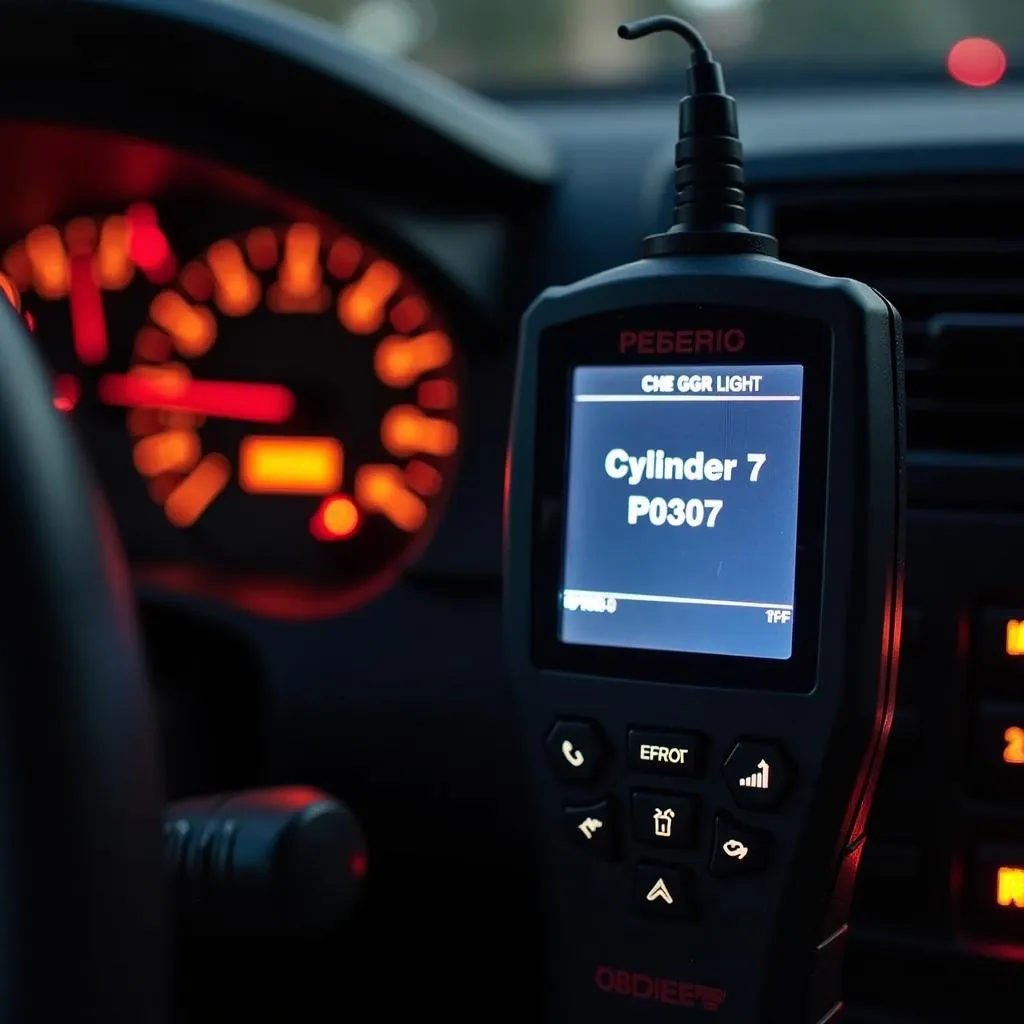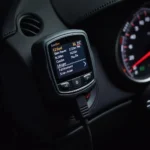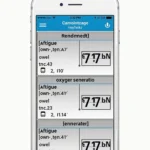A flashing check engine light and your car sputtering like it’s about to quit are never good signs. If you’ve recently experienced this along with a noticeable drop in engine performance, there’s a good chance your OBD2 scanner will display the code P0307. This code indicates a cylinder 7 misfire, a common yet potentially serious engine problem. This comprehensive guide will delve into the intricacies of the P0307 code, explaining its meaning, causes, symptoms, diagnostic procedures, and most importantly, the solutions to get your car running smoothly again.
What Does Code P0307 Mean?
In simple terms, the P0307 code means your car’s engine control unit (ECU) has detected a misfire in cylinder number 7. A misfire occurs when the air-fuel mixture in a cylinder fails to ignite properly or at the right time, disrupting the engine’s combustion cycle. This not only affects your car’s performance but can also lead to increased emissions and potential damage to your catalytic converter if left unaddressed.
Common Causes of OBD2 Code P0307
Identifying the root cause of the P0307 code is crucial for effective repair. While a cylinder 7 misfire can stem from various factors, some common culprits include:
- Faulty Spark Plugs or Wires: Worn-out or fouled spark plugs can cause weak sparks, preventing proper ignition of the air-fuel mixture. Similarly, damaged or worn spark plug wires can disrupt the electrical current flow to the spark plug.
- Clogged or Defective Fuel Injector: A clogged fuel injector restricts the amount of fuel delivered to the cylinder, while a faulty injector might not deliver fuel at all, leading to misfires.
- Vacuum Leaks: Leaks in the intake manifold or vacuum hoses can disrupt the air-fuel ratio, causing lean mixtures and misfires.
- Low Compression in Cylinder 7: Problems with piston rings, valves, or the cylinder head gasket can lead to low compression in the cylinder, hindering proper combustion.
- Faulty Ignition Coil: The ignition coil provides the high voltage necessary for the spark plug to ignite the fuel. A malfunctioning coil can cause weak or inconsistent sparks, leading to misfires.
Symptoms of a P0307 Code
Besides the illuminated check engine light, a cylinder 7 misfire can manifest through various noticeable symptoms:
- Engine Misfires and Rough Idle: You’ll likely experience engine hesitation, stumbling, or shaking, especially when idling.
- Reduced Engine Performance: The misfire will cause a noticeable loss of power and acceleration, making your car feel sluggish.
- Increased Fuel Consumption: As the engine struggles to compensate for the misfiring cylinder, it consumes more fuel, impacting your gas mileage.
- Engine Noise: You might hear unusual noises from the engine, such as popping, backfiring, or knocking, indicating combustion problems.
- Strong Fuel Odor: Unburnt fuel escaping into the exhaust system can produce a noticeable gasoline smell.
Diagnosing the P0307 Code
While the P0307 code specifically points to cylinder 7, diagnosing the exact cause requires a systematic approach. Here’s a step-by-step guide:
- Read the Code: Start by connecting your OBD2 scanner and retrieving the stored codes. Note any additional codes, as they might provide valuable clues.
- Inspect the Spark Plugs and Wires: Visually examine the spark plug for signs of wear, fouling, or damage. Check the spark plug wires for cracks, burns, or loose connections.
- Check for Vacuum Leaks: Inspect the intake manifold and vacuum hoses for any signs of cracks, loose connections, or damage.
- Test the Fuel Injector: You can use a fuel pressure gauge to check for proper fuel pressure, indicating injector functionality.
- Perform a Compression Test: This test measures the pressure in each cylinder and helps identify potential problems with piston rings, valves, or head gaskets.
- Inspect the Ignition Coil: Check the ignition coil for damage or test it for proper resistance and output voltage.
Fixing a P0307 Code: Effective Solutions
The repair method for a P0307 code depends entirely on the underlying cause identified during diagnosis. Here are the most effective solutions:
- Replace Faulty Spark Plugs or Wires: If the spark plugs are worn or fouled, replacing them is crucial. It’s also recommended to replace the spark plug wires to ensure optimal performance.
- Clean or Replace Fuel Injectors: Clogged injectors can often be cleaned using a fuel injector cleaner additive. However, if an injector is faulty, replacement is necessary.
- Repair Vacuum Leaks: Depending on the location and severity of the leak, you might need to replace damaged hoses, tighten clamps, or seal leaks in the intake manifold.
- Address Low Compression Issues: Low compression often requires more extensive repairs, such as replacing piston rings, repairing valves, or even rebuilding the cylinder head.
- Replace Faulty Ignition Coil: If the ignition coil is malfunctioning, replacing it is the most reliable solution to restore spark and resolve the misfire.
Preventing Future P0307 Codes
While some causes of P0307 codes are beyond your control, adhering to a regular maintenance schedule can significantly reduce their likelihood:
- Regularly Replace Spark Plugs: Consult your owner’s manual for the recommended spark plug replacement interval.
- Inspect and Clean Fuel Injectors: Consider using fuel injector cleaner additives periodically or have your injectors professionally cleaned.
- Address Engine Misfires Promptly: Ignoring engine misfires can exacerbate the problem and lead to more costly repairs.
- Use High-Quality Fuel and Oil: Using good quality fuel and oil can prevent deposits and keep your engine running smoothly.
Conclusion
A P0307 code, indicating a cylinder 7 misfire, can be a frustrating experience for any car owner. However, understanding its causes, symptoms, and solutions empowers you to address the issue effectively and get your car back on the road with confidence. Remember, timely diagnosis and repair are crucial to prevent further engine damage and costly repairs down the line.
FAQs About OBD2 Code P0307
Q: Can I still drive my car with a P0307 code?
A: While you might be able to drive short distances, it’s not recommended. Driving with a misfire can damage your catalytic converter and lead to more serious engine problems.
Q: How much does it cost to fix a P0307 code?
A: The repair cost varies widely depending on the underlying cause. Simple fixes like replacing spark plugs are relatively inexpensive, while more complex repairs like addressing low compression can be significantly more costly.
Q: Can a bad oxygen sensor cause a P0307 code?
A: While a faulty oxygen sensor can disrupt the air-fuel mixture, it’s less likely to directly cause a cylinder-specific misfire like P0307. However, a bad oxygen sensor can contribute to overall engine performance issues.
Q: Can I fix a P0307 code myself?
A: If you’re mechanically inclined and have the necessary tools, you can attempt some repairs, like replacing spark plugs. However, more complex diagnostics and repairs are best left to qualified mechanics.
Q: How can I prevent future misfire codes?
A: Adhering to a regular maintenance schedule, including timely spark plug replacements, fuel injector cleaning, and addressing engine issues promptly, can significantly reduce the likelihood of future misfire codes.
Need further assistance with your OBD2 code P0307? Our expert team is available 24/7 to answer your questions and provide guidance. Contact us via WhatsApp: +1(641)206-8880, Email: [email protected]. We are here to help!


